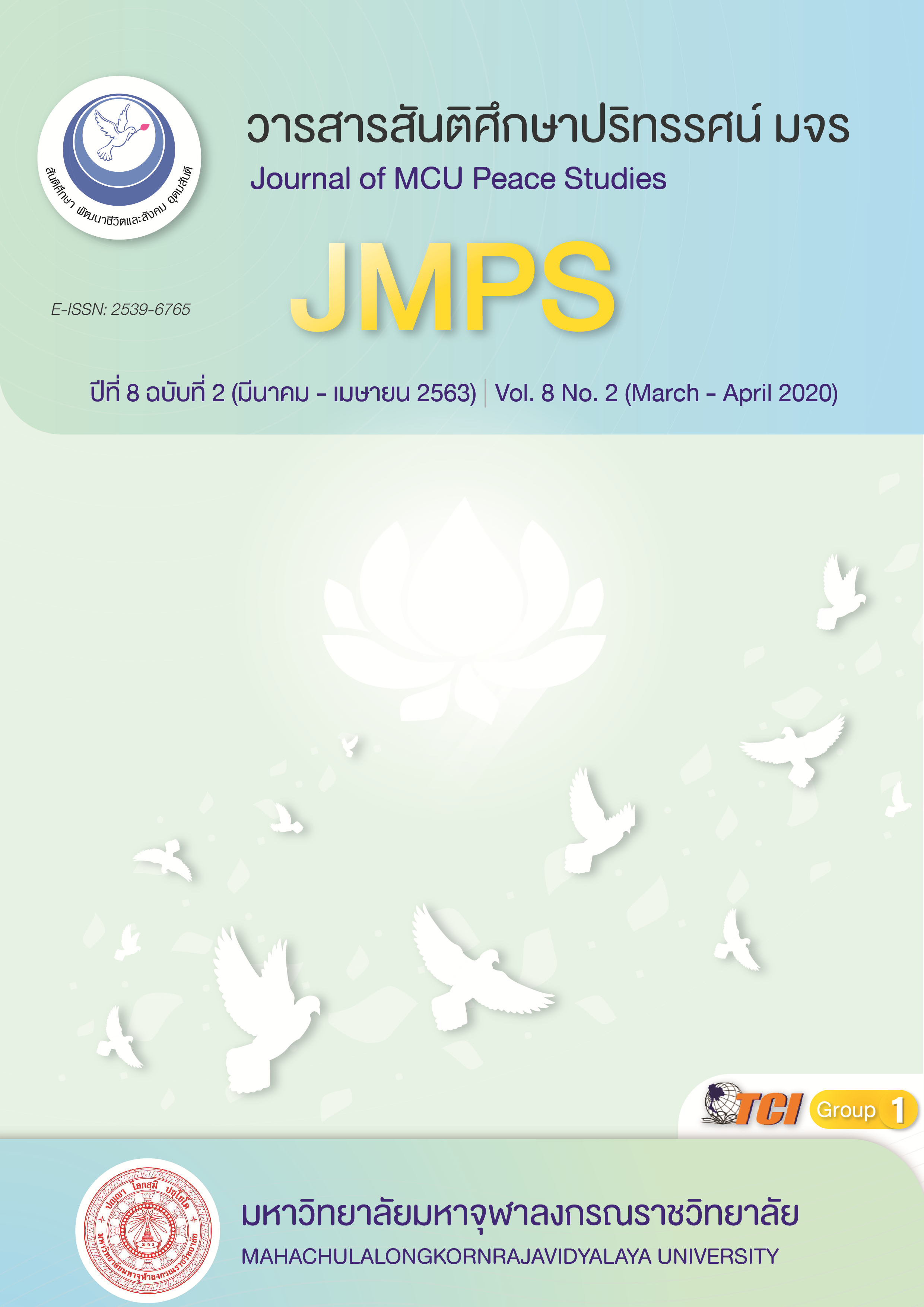การประยุกต์ใช้หลักปรัชญาของเศรษฐกิจพอเพียงในการพัฒนาชุมชน ของวัดและชุมชนในจังหวัดขอนแก่น
Main Article Content
บทคัดย่อ
การวิจัยครั้งนี้มีวัตถุประสงค์เพื่อ 1) ศึกษาแนวคิดและหลักการการพัฒนาชุมชนของวัดและชุมชนในจังหวัดขอนแก่น 2) ศึกษาการประยุกต์ใช้หลักปรัชญาเศรษฐกิจพอเพียงในการพัฒนาชุมชนของวัดและชุมชนในจังหวัดขอนแก่น และ 3) เพื่อสร้างเครือข่ายของวัดและชุมชนในการประยุกต์ใช้หลักปรัชญาเศรษฐกิจพอเพียงในการพัฒนาชุมชนในจังหวัดขอนแก่น ใช้รูปแบบการวิจัยเชิงคุณภาพ เป็นการวิจัยเชิงเอกสารและการสัมภาษณ์เชิงลึกในพื้นที่การวิจัย 5 อำเภอของจังหวัดขอนแก่น ประกอบด้วย ปราชญ์ชาวบ้าน ผู้นำท้องถิ่น ผู้นำชุมชน พระสงฆ์ ตัวแทนภาครัฐ ชาวบ้าน และภาคีเครือข่ายในจังหวัดขอนแก่น จำนวน 2 เครือข่าย วิเคราะห์วิธีการพรรณนาตามหลักอุปนัยวิธี
ผลการวิจัยพบว่า 1) แนวคิดและหลักการการพัฒนาชุมชนของวัดและชุมชนในจังหวัดขอนแก่น พบว่า มี 5 แนวคิด คือ (1) แนวคิดการสร้างสังคมคุณภาพ (2) แนวคิดในการสร้างสังคมอุดมปัญญา
(3) แนวคิดในการสร้างสังคมคุณธรรม (4) แนวคิดในการสร้างสังคมนวัตวิถี และ (5) แนวคิดในการสร้างความร่วมมือและเครือข่ายระหว่างชุมชน 2) การประยุกต์ใช้หลักปรัชญาเศรษฐกิจพอเพียงในการพัฒนาชุมชนของวัดและชุมชนในจังหวัดขอนแก่น พบว่า แบ่งเป็น 3 ระดับ คือ 1) ระดับพื้นฐาน 2) ระดับก้าวหน้าแบบกลุ่ม และ 3) ระดับก้าวหน้าแบบเครือข่าย การกระทำตามแนวปรัชญาเศรษฐกิจพอเพียงหรือการประยุกต์คือการ
ตัดสินใจที่เหมาะสมโดยใช้หลักปรัชญาเศรษฐกิจพอเพียง ตัดสินใจตามหลักสามห่วง สองเงื่อนไข โดยมีจุดมุ่งหมายเพื่อการพัฒนาที่สมดุลและยั่งยืน 3) สร้างเครือข่ายของวัดและชุมชนในการประยุกต์ใช้หลักปรัชญาเศรษฐกิจพอเพียงในการพัฒนาชุมชนในจังหวัดขอนแก่น พบว่า มี 5 แนวทาง คือ 1) การริเริ่มและดำเนินการร่วมกัน 2) ความร่วมมือระหว่างกัน 4) การร่วมมือกับหน่วยงานภายนอก และ 5) การกำหนดเป้าหมายร่วมกัน ผลการสร้างเครือข่ายนำไปสู่ความร่วมมือของวัดและชุมชนในการใช้ทรัพยากรและแลกเปลี่ยนนวัตกรรมเพื่อการพัฒนาร่วมกันอย่างยั่งยืน
Article Details
ทัศนะและความคิดเห็นที่ปรากฏในบทความในวารสาร ถือเป็นความรับผิดชอบของผู้เขียนบทความนั้น และไม่ถือเป็นทัศนะและความรับผิดชอบของกองบรรณาธิการ ยินยอมว่าบทความเป็นลิขสิทธิ์ของวารสาร
เอกสารอ้างอิง
Andawanich, S., & Chaiyanan, W. (1996). Concepts and indicators of social development and quality of life and Thai society. In Anuchat Phuangsom and Orathai At-am (Editor), Development Indicators Tool of quality of life and Thai society. Bangkok: Office of Research Funds.
Chandaeng, V. (2018). Online research article on the development of a strong community management model in accordance with the sufficiency economy philosophy in the upper central region. Retrivedved January 3, 2018, from https://www.tcithaijo.org/index.php/tgt/article/view
Chareonwongsak, K. (2007). Sufficiency Economy Course in educational institutions How to be successful. weekly study today, 7(315), 11 – 18.
Chuelueam, K., Suthisukon, P., & Khamm, D. (2007). Sufficiency Economy Philosophy: Toward Management Strategies. Journal of Public Health and Development, 5(2), 105-106.
Chutiwisut, P. (2010). The application of the sufficiency economy philosophy in teaching and learning Undergraduate. Romyuk Journal, 28(2), 152-153.
Kamla, N. (2014). The role of the development of the sufficiency economy learning center in the community: a case study of Chumpae District, Khon Kaen Province. Systematic Agriculture Program. Faculty of Agriculture. Khon Kaen University.
Kanchanachitra, C. (1989). Community Development. Bangkok: Ramkhamhaeng University.
Lienjumroon, W. (2011). Agricultural Reform for Food Security: Analysis and Policy reform. Samut Sakhon: Pimdee.
Naowavathong, P. (2008). Sufficiency Economy Community Management: A case study of Kamplalai Village, Ban Dong,sub-districts,Ubonrat District,Khon Kaen Province. Journal of Environmental Management, 4(2).
Nopkesorn, T. (1998). Original draft of the Thai social crisis 1997 with the role of guest speakers for participation in organizing a community forum. Bangkok: Office of Teacher Training Office of Rajabhat Institutes Council.
Office of the National Economics and Social Development Council. (2000). 5 decades Latphat. Nonthaburi: Petrung Printing.
Office of the National Economic and Social Development Council. (2004). Application of the Sufficiency Economy Philosophy. (2nd ed.). Bangkok: Thai Development Foundation.
Office of the National Economics and Social Development Council. (2008). Philosophy of the Sufficiency Economy. Bangkok: 21 Century.
Office of the National Economics and Social Development Council. (2000). 5 decades Latphat. Nonthaburi: Petrung Printing.
Phanmool, J., & Masae, A. (2011). Community development process towards sufficiency economy: a case study of Ban Nawiang, Ko Kha District, Lampang Province. Kasalongkham Academic Journal, 139-140.
Phradhammapitaka (P.A. Payutto). (2009). Community Way. Bangkok: Srinakharinwirot University.
Phramaha Sanga Polsongkram. (1999). A Comparative Study of Buddhist Economics and the Sufficiency Economy in Thai Society. (Master's Thesis). Graduate School: Mahidol University. Nakhon Pathom.
Pongpit, S. (2008). Concepts, practices of local development strategies. Bangkok: Charoen Wit Printing.
Pattamanun, U. (2003).Economic crisis, adjustment of commercial banks of Thailand. Bangkok: Institute of Asian Studies. Chulalongkorn University.
Pawala, T. (2018). The Development of a Community Model According to The Philosophy of Sufficiency Economy, Level Prosperous: A case Study of Nong Phueak Village, Wapi Pathum District, Maha Sarakham Province. Phra Varun Agriculture Journal, 15(1), 101-11.
Phrasriwisutmolee (Prayut Payutto). (1973). The role of monks in the development of Buddhism and the present society, Bangkok: Siwiporn.
Tepsitta, S. (2005). Sufficiency economy according to the royal initiative. Bangkok: Thammasarn Company Limited.
Walaisatien, P. (2000). Development Process and Techniques of Developers. Bangkok: Office of Research Support Division.
Wiruchnipawan, W. (2008). Management according to the moral guidelines and the sufficiency economy guidelines. Bangkok: Propet.
Yuyen, K. (2001). The dynamics of Ban Pred community under the concept of sufficiency economy. Community development. (Master's Thesis). Graduate School: Thammasat University. Bangkok.


